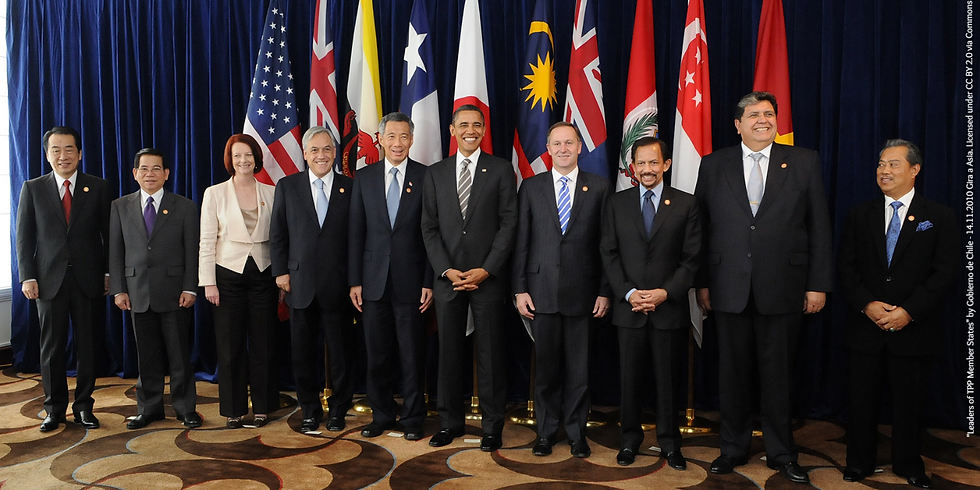Trans-Pacific Partnership Misconceptions Addressed
- Sarah Adams, Geo. S. Bush & Co., Inc.
- Nov 4, 2015
- 4 min read

"Leaders of TPP Member States" by Gobierno de Chile - 14.11.2010 Gira a Asia. Licensed under CC BY 2.0 via Commons
On Tuesday, October 9th 2015, the United States and the eleven other countries in the Trans-Pacific Partnership [TPP] finally reached a deal on the planned Free Trade Agreement. While this is great news for the international trade community, only half of the battle has been won. Now Obama must redirect his energies domestically to convince Congress and the general public that the TPP is good deal for the United States and its workers. Free trade deals are commonly decried by the left as a corporate-driven mechanism by which “the rich get richer” and everyday American jobs are sent overseas. Much of this stance is emboldened by the fact that critics of NAFTA, the North-American Free Trade Agreement, have been highly skeptical of its advantages and critical of its detrimental effects on the American workforce. Whether or not that’s a fair characterization contains an element of subjectivity, but not all free trade deals are created equal, and the merits of TPP must be looked at independently of any misgivings about NAFTA to determine if this is a good deal for the American people.
An oft-cited and viable concern about NAFTA was its inability to address environmental or labor rights issues. Although the deal gave a nod to these two concerns by putting them in a side-letter, this effort proved to be fruitless as those provisions were not enforceable. The TPP tackles this issue head on, including higher environmental and labor rights standards within the deal itself[1]. Per President Obama, “It’s the highest-standard, most progressive trade deal in history. It’s got strong, enforceable provisions for workers, preventing things like child labor. It’s got strong, enforceable provisions on the environment, helping us to do things that haven’t been done before, to prevent wildlife trafficking, or deforestation, or dealing with our oceans. And these are enforceable in the agreement.”[2] As a condition to receive the benefits of engaging in the Free Trade commerce within the Pacific Rim, signatory countries are required to raise their standards to a higher level.
The loss of US jobs to foreign markets has been an issue in the past, but in 2015, the companies that want to flee the US and make a better profit margin overseas have already done so. As evidenced by Obama’s talk at Nike in March of 2015, the TPP is poised to specifically revitalize exports to foreign countries, not imports from manufacturers who move overseas. At this point in time, foreign countries have plenty of imports into the US, but high tariffs and other non-tariff barriers prevent the US from exporting to our highest potential. The TPP creates an environment where US manufactured goods can enter into other economies. Although this will undoubtedly benefit large exporters like Boeing or Intel, this will be invaluable for SMEs [small and medium exporters]. According to Representative Blumenauer’s Online Trade FAQ, 90% of Oregon’s 6,000+ exporters are SMEs. Increased exports alone for those businesses would be a palpable boost to Oregon’s economy. More US manufactured goods exported without undue regulations directly translates into US jobs.
Additionally, harkening back to the progressive tendency to value union jobs above all else, just because a job is not a union-specific job does not automatically make it a “corporate” job. Improved trade means more jobs for everyone in the supply chain: manufacturers, suppliers, forwarders, brokers, IT systems, port workers, truckers, warehouses, and, yes [labor issues at the Port of Portland notwithstanding] even longshoremen. Moreover, four of the United State’s largest labor unions – the International Brotherhood of Teamsters, United Auto Workers, United Food and Commercial Workers, and United Steel Workers – are members of the president’s Advisory Committee on Trade Policy Negotiations[3]. This illustrates that, despite the strong anti-TPP rhetoric of some union advocates, unions are not just being left out in the cold, but have been invited to engage in trade deal conversations. To say that the TPP will only benefit corporations and that it will negatively affect all unions is patently untrue.
It would be judicious for the TPP to go to a vote while Obama is still in the presidency, for rolling it over to a new president would submit the deal to the new ideas and intentions of a new head of state. The Pacific Coast Council – a west coast trade association to which the CRCBFA belongs – vows to continue to advocate for the TPP. To quote the statement put out by the PCC, “The increase in international shipments that will result from the Trans-Pacific Partnership will spur employment throughout the supply chain, and benefit the hundreds of US small businesses that perform the customs broker and freight forwarder services on the west coast and nationally.” Concerns of what a new Free Trade Agreement will truly do for our economy are valid, and should be addressed with our elected officials, but the TPP will not result in such disastrous consequences as have been purported. We must move forward making decisions on facts, not assumptions or politically-ingrained party habits.
For more information on the Trans-Pacific Partnership, read the Congressional Research Service [CRS] report “The Trans-Pacific Partnership (TPP) Negotiations and Issues for Congress,” written by Ian F. Fergusson, Mark A. McMinimy, and Brock R. Williams in March 2015. The CRS provides objective and non-partisan policy and legal analysis to the US Congress.
----------------------------------------------------------------------------------------------------------------------------------------------------
[1] Lincicome, Scott. "Top 9 Myths About The Trans-Pacific Partnership." The Federalist. N.p., 09 June 2015. Web. 27 Sept. 2015.
[2] Obama, Barack. Remarks by the President on Trade at Nike, Inc. United States, Beaverton, OR. 08 May 2015.
[3] Blumenauer, Earl. "Frequently Asked Questions on Trade." Frequently Asked Questions on Trade. N.p., n.d. Web. 23 Sept. 2015.








Comments